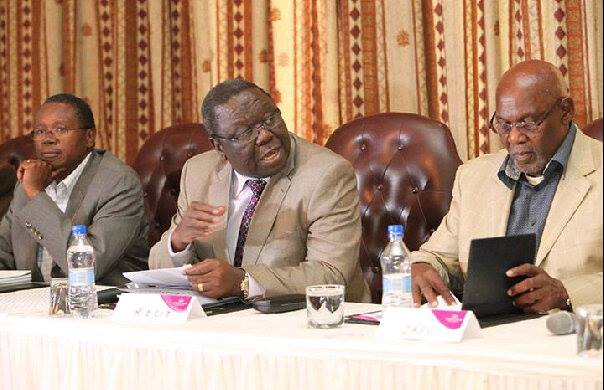Why a grand coalition is a tall order
By Ray Ndlovu
PRESIDENT Robert Mugabe and his ZANU-PF party are firmly in charge after winning last year’s election. Barring any unfortunate act of nature, nothing before the next 2018 election is set to destabilise the ruling party to the point of handing over any recognisable advantage to the opposition’s ranks.

This scenario would likely culminate into an open race for the highest office in the land — with jostling for the top job certain to not only come from opposition party leaders, but also from top ZANU-PF lieutenants who in the meantime are forced to lurk in the shadows.
In the absence of any natural event to force a change on the country’s political landscape, the opposition is mulling putting together a formidable front to stand against President Mugabe.
Yet the task remains not only arduous and daunting, but has been worsened by the infighting in the Movement for Democratic Change (MDC-T) which has split into two formations led by party president Morgan Tsvangirai and secretary-general Tendai Biti.
The MDC-T infighting along factional lines is day by day emerging as the central issue that could make-or-break the attempt at putting together a grand coalition.
Biti’s fallout with Tsvangirai has in effect taken centre-stage and may result in the two warring factions not joining the same grand coalition that increasingly appears hell-bent on avoiding Tsvangirai from being a part of it. The fears, either real or imagined, stem from the view that Tsvangirai is deemed a poisoned chalice unfit to be a part of the grand coalition.
He has lost three successive elections against President Mugabe, led a questionable private life and somewhat tarnished the MDC-T brand built over its 15-year-long history. As a result, Tsvangirai’s strengths as the leader of the country’s largest opposition party are likely to be overlooked in favour of his weaknesses.
A glance at numbers, however, shows that Tsvangirai brings more to the table than his critics would be willing to admit and clearly remains popular among voters.
Last year’s election results indicates that Tsvangirai at 33,96 percent of the vote which is 1 172 349 votes dwarfs his next closest rivals in the opposition ranks, making him a favourite among voters.
Welshman Ncube, leader of the smaller MDC received only 2,68 percent, translating to 92 637 votes, Dumiso Dabengwa of ZAPU received 0,74 percent which is 25 416 votes and Kisinoti Mukwazhe of the Zimbabwe Development Party polling 0,29 percent which is 9 931 votes.
Additionally in his favour is that Tsvangirai also won the first round of voting in the 2008 election against President Mugabe, a feat never achieved before since the country gained independence from Britain in 1980. Yet a section of the opposition forces pushing for a grand coalition contends that it can still go it alone without Tsvangirai.
Kurauone Chihwayi, the MDC secretary for international relations gave a sharp rebuke over calls for Tsvangirai’s inclusion in the grand coalition.
“Those believing that a united front without Tsvangirai will not work are mentally rotten and baselessly over-licking him for their own supper,” said Chihwayi.
So what is the solution? Piers Pigou, the Southern Africa director of the International Crisis Group told the Financial Gazette this week from his Johannesburg office that the grand coalition could only succeed if a high level of maturity was demonstrated by opposition leaders.
“Whatever the problems are that they have with Tsvangirai; he still remains the voice of the opposition in Zimbabwe. If it (grand coalition) is to succeed, they must show enough maturity to come together on a common platform…” said Pigou.
“The tragedy is that the opposition is spending time fighting amongst itself than dealing with ZANU-PF, fighting corruption and addressing economic issues. We are seeing a dearth of leadership and all opposition forces need to urgently re-assess what it was that brought them together in 1999. They need introspection. Simply excluding Tsvangirai from the process would only weaken further the opposition against ZANU-PF”.
Charles Mangongera, a United States-based political commentator, said the grand coalition could find traction among voters, who would be more than ready to support a new democratising initiative. “But if it becomes a marriage of convenience that is not defined by a fundamental value system then it will not be sustainable,” cautioned Mangongera.
“Zimbabwe is ready for such an idea and I see it succeeding if it is not hijacked for personal interests”.
As the disagreements persist within the opposition’s ranks and discord tears it apart, the ruling ZANU-PF remains relatively safe. Recent talks of a grand coalition among the opposition, though gaining momentum are unlikely to jolt ZANU-PF into panic just yet.
Previous attempts to put together a challenge to President Mugabe have all failed to take off. The opposition faces irreconcilable differences on ideology, principles and culture — much to the ruling party’s gain.
In the run-up to the 2013 harmonised elections, Tsvangirai partnered with Simba Makoni, while Ncube joined forces with Dabengwa — both attempts failed to take the wind out of Team ZANU-PF’s sails and dealt no obvious impact on the political landscape.
Observers posit that opposition leaders in Zimbabwe may do well to draw lessons on putting together a grand coalition from Kenya.
In 2002, after two near wins at the ballots, opposition political parties in Kenya coalesced to form the National Rainbow Coalition of Kenya (NARC) to challenge the rule of KANU, the dominant ruling party formed in 1963. Miwa Tsuda, an academic, said the coalition of the opposition helped unseat KANU which had enjoyed nearly four decades of uninterrupted rule.
“The then newly-formed NARC won 133 parliamentary seats out of 222, becoming the nation’s ruling party. NARC defeated KANU, which had been Kenya’s ruling party since independence in 1963,” Tsuda said. Financial Gazette






